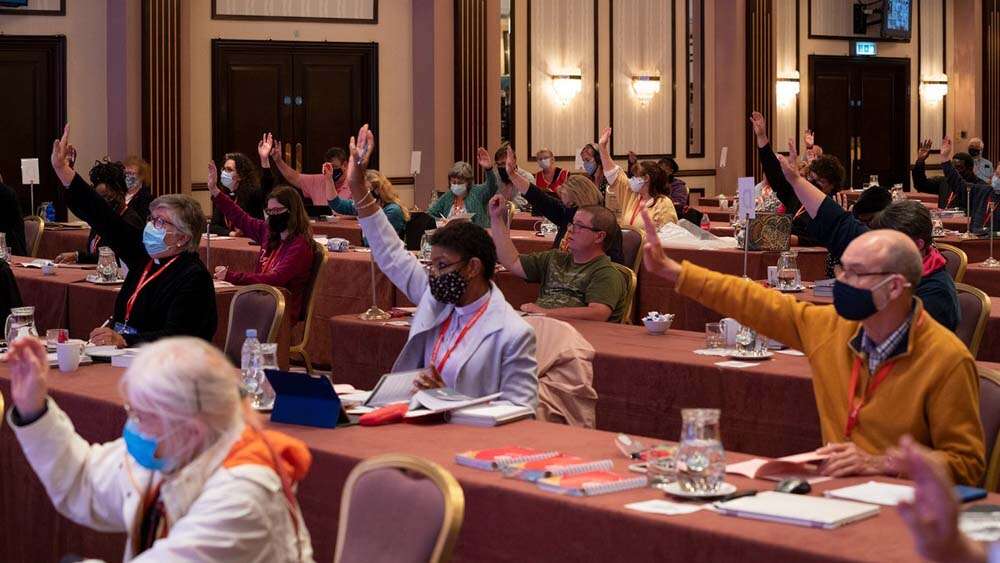UK Methodists have adopted a similar model to the Uniting Church in Australia’s (UCA) “two rites” approach to same-sex marriage. The Methodist Conference has passed motions to allow “same-sex marriages conducted on Methodist premises or by Methodist office-holders”.
The conference has also amended the Methodist standing orders to change “a life-long union in body, mind and spirit of one man and one woman” to “two people.” A further change adds, “Within the Methodist Church this is understood in two ways: that marriage can only be between a man and a woman; that marriage can be between any two people. The Methodist Church affirms both understandings and makes provision in its Standing Orders for them.”
This resembles the UCA model, as expressed in a 2018 letter by President Deidre Palmer: “The Assembly resolved to honour the diversity of Christian belief among our members by holding two equal and distinct statements of belief on marriage.”
A second Methodist motion affirmed cohabitation: “The Church recognises that the love of God is present within the love of human beings who are drawn to each other, and who enter freely into some form of life-enhancing committed relationship with each other, whether that be through informal cohabitation or a more formal commitment entered into publicly.” This motion also says, “The Church has an important calling, therefore, to point to the presence of God’s love within such relationships”.
The Methodist church described the debate this way: “Speakers called for unity going ahead irrespective of the decision. Other speakers spoke of the acceptance of diversity that younger Church members have for each other with younger speakers relating their own lived experience as Christians from the LGBTQI+ community. Another representative asked that the Church does not ostracise those who oppose the introduction of same-sex marriages in the Church, saying the great majority of these people are trying to be faithful to Scripture as they see it.”
Evangelicals described the passing of the motions as a sad day for the church.
“It’s heart-breaking really to see where we’ve come and the way in which we’ve got here, and many of us have wept over it,” David Hull, chair of Methodist Evangelicals Together told Premier Christian Radio, “In spite of these votes there are many, many Methodists who still believe that Jesus offers a unique vision for life – one that is rooted deeply in the Bible, that is better than the world has ever known, better than the world will ever know and that includes this teaching on marriage and relationships.”
A group promoting LGBTIQ+ inclusion in Methodism, Dignity and Worth, described “a momentous step on the road to justice and inclusion.” They added “This is a joyful day for many of us within, and beyond, the Methodist Church. But we acknowledge that for some, this is a difficult decision and one they cannot support. We continue to hope that we can continue to journey together with them in love.”
Wee Flea blogger David Robertson, who now comments from Sydney but retains a high profile in the UK makes the case that evangelicals should leave, and describes the Methodist moves as apostasy.
“I am not one of those who say you should never belong to a ‘mixed’ denomination. After all the wheat and the tares grow together. But there does come a point when the ‘mix’ is so imbalanced that to stay in, means that you harm yourself, others, and bring disgrace upon the Gospel. In my view the Methodist Church this week went past that tipping point.
“Can God still use people who stay in the Methodist Church? – of course he can! He is God. But just because God can do something with the mess that we create, does not mean that we should disobey Him in order for him to show his power! Just because the Lord can use a donkey, does not mean that we should start braying!
“We simply have to ask what Jesus thinks, and what he wants us to do… and we know that through his Word. We are not to be yoked together with unbelievers – and that is not primarily a message about marriage, but one about uniting with others in worship.”
Email This Story
Why not send this to a friend?



